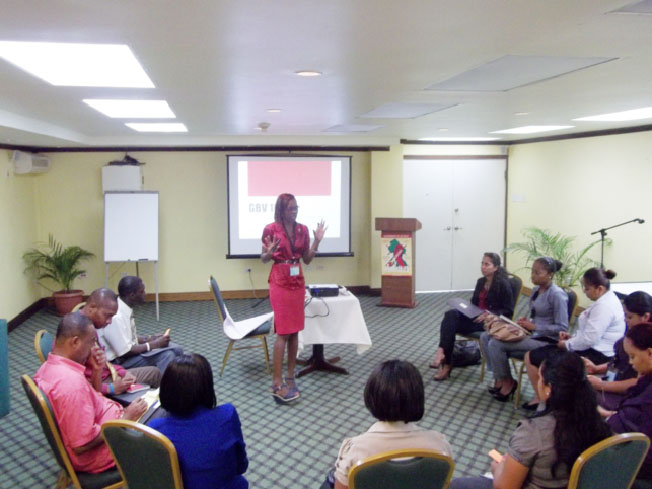Q. Have you been able to measure the impact which the Coalition has had on employer responses to HIV/AIDS at the workplace?
A. Yes. We have been able to do so through the various sustained elements of workplace programmes. Throughout the life of the Coalition and organization workplace programmes one of the main aims has been the reduction of stigma related to HIV in workplaces – we receive no reports about incidents regarding stigma and discrimination in the workplaces mainly because of the frequent HIV awareness activities taking place in workplaces; secondly, there is continued employee participation in peer educator training. Prevention activities go beyond the education of employees to the supply of condoms in the workplaces. Employers also promote HIV counselling and testing services and employees sometimes access these services at their worksites. All of these initiatives give clear indications of not only the reduction of HIV related stigma but employers’ willingness to treat HIV as everyone’s business. Organisations recognize the importance of knowing one’s status and as such HIV testing is a frequent occurrence at many company sites without fear of discrimination. Finally, trained peer educators adapt the tools and techniques used by the HIV workplace programme in other health and wellness areas.

Q. What, in your view have been the signal accomplishments of the Coalition?
A. Noteworthy is the GBCHA’s ability to maintain workplace programmes after the end of the USAID grant which facilitated awareness sessions and peer educator trainings. Through the support of Coalition membership technical support is offered by the GBCHA Secretariat which employs a small staff. For the past six years, the GBCHA has recognized private sector response at the Annual Awards for Business Excellence. The sustainability of the awards is also a major accomplishment for the GBCHA. Another stellar accomplishment of the GBCHA is increased partnerships with the National AIDS Programme and other NGOs all working to strengthen the local response to HIV/AIDS in Guyana.
The Coalition has also extended its focus to include Gender Based Violence awareness. Today the Coalition is able to raise awareness of hundreds of employees who in turn inform their families and friends. The Coalition is able to provide Voluntary Counselling and Testing to employees as well as walk in clients.
Q. In what particular ways have employees (with HIV/AIDS) benefited from working environments sensitive to PLWHAs?
A. The GBCHA supported workplace programmes has a strong anti stigma and discrimination component which outlines not only transmission and prevention information but care and support information. Emphasis is placed on recognizing the ILO principles and other aspects of the National HIV/AIDS policy. Employers are reminded of the importance of confidentiality and reasonable accommodation and employees and employers alike are informed of their rights.
Q. Has the Coalition grown significantly since its inception? (What were the numbers when it started? What are the numbers now)
A. The GBCHA has over 25 active member companies. On roll the membership of the Coalition reflects 47 organizations, an increase from the 43 initial members. The growth of the Coalition is measured by reach and quality of programme in addition to quantity of members. Much assessment and planning has been done to categorize the membership base and work continues to increase the number of active members.

Q. It had been the practice some years ago that issues to do with HIV/AIDS at the workplace were left to relatively junior and middle-ranking staff. Has that changed and are CEO’s now taking a more hands-on position on the issue?
A. When an organization signs up with the GBCHA, the entire organization benefits! Heads of organizations are indeed taking a more ‘hands on’ approach as it relates to HIV/AIDS in the workplace and this is very evident in the number of private sector companies signed on with the GBCHA as well as the willingness of heads and senior managers to take up positions on the GBCHA Board of Directors. Head of organizations attend workplace awareness sessions, they ensure that their employees receive the necessary information to help them to live more healthy lives as well as make sure that employees are also trained as peer educators and they guarantee that their companies support numerous HIV/AIDS related activities, e.g. Phillip Vanderhyden Walkathon, NAPS Food Bank.
Q. HIV/AIDS no longer seems to be at the forefront of the national agenda. How important an issue is it at this juncture?
A. HIV/AIDS continues to be an important issue and should be given top priority on the national agenda. There is a critical need for sustained private sector response especially due to decreased donor funding. Also, HIV/AIDS should be treated as important so that collectively we can work towards the prevention of new infections.
Q. How much progress has the Coalition made in penetrating challenging work environments like the sex workers industry in the gold mining regions of Guyana?
A. Though the Coalition has no targeted initiatives to reach sex workers, this population has been reached by the VCT services and other prevention outreach.
Q. What is the Coalition’s short to medium-term agenda?
A. Workplace programme – it is the intention of the GBCHA to meet employees where they spend most of their day, in the workplace to raise awareness about HIV/AIDS, GBV and other health related illnesses. Secondly, the GBCHA agenda is the goal of working with private sector companies to harness their company’s strengths (products, services, resources) to promote action on HIV/AIDS and to develop partnerships between these companies and government and community organizations to strengthen the local response to HIV/AIDS. Thirdly, the GBCHA seeks to facilitate and promote the development of leaders within the private sector.





